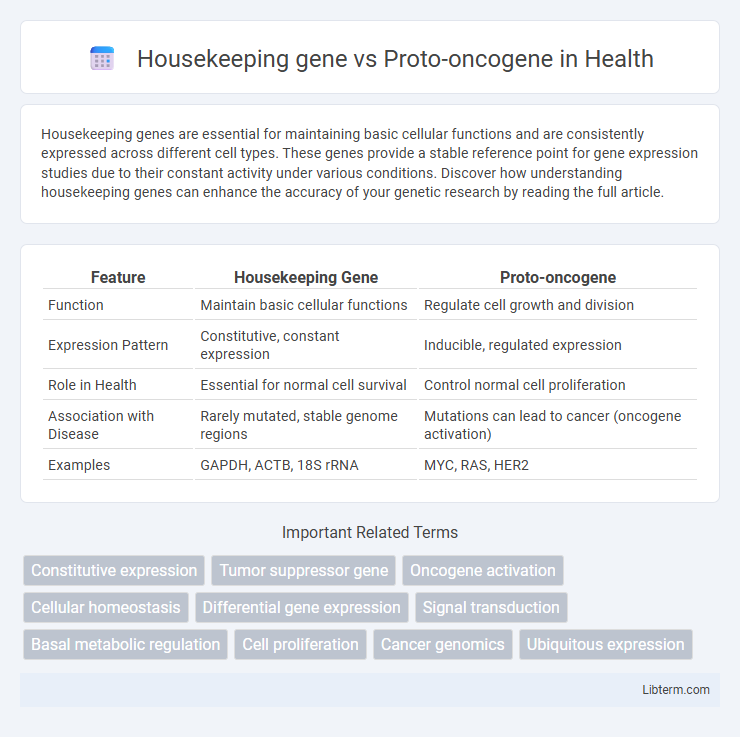Housekeeping genes are essential for maintaining basic cellular functions and are consistently expressed across different cell types. These genes provide a stable reference point for gene expression studies due to their constant activity under various conditions. Discover how understanding housekeeping genes can enhance the accuracy of your genetic research by reading the full article.
Table of Comparison
| Feature | Housekeeping Gene | Proto-oncogene |
|---|---|---|
| Function | Maintain basic cellular functions | Regulate cell growth and division |
| Expression Pattern | Constitutive, constant expression | Inducible, regulated expression |
| Role in Health | Essential for normal cell survival | Control normal cell proliferation |
| Association with Disease | Rarely mutated, stable genome regions | Mutations can lead to cancer (oncogene activation) |
| Examples | GAPDH, ACTB, 18S rRNA | MYC, RAS, HER2 |
Introduction to Housekeeping Genes and Proto-oncogenes
Housekeeping genes are essential for basic cellular functions and are consistently expressed in all cell types to maintain fundamental biological processes such as metabolism and cell structure integrity. Proto-oncogenes are normal genes that regulate cell growth and division but can become oncogenes through mutations, contributing to cancer development by promoting uncontrolled proliferation. Both gene types are critical for normal cellular function, with housekeeping genes ensuring cellular maintenance and proto-oncogenes controlling growth signals.
Definition of Housekeeping Genes
Housekeeping genes are essential genes that maintain basic cellular functions and are consistently expressed in all cell types under normal physiological conditions. Unlike proto-oncogenes, which regulate cell growth and division and can lead to cancer when mutated, housekeeping genes ensure cellular maintenance by providing proteins necessary for processes such as metabolism, DNA repair, and cell structure integrity. Their stable expression across diverse tissues makes housekeeping genes critical reference points in gene expression studies.
Definition of Proto-oncogenes
Proto-oncogenes are normal genes that encode proteins essential for regulating cell growth, differentiation, and apoptosis. Unlike housekeeping genes, which maintain basic cellular functions and are constantly expressed, proto-oncogenes become oncogenes when mutated or overexpressed, leading to uncontrolled cell proliferation and cancer development. Key examples of proto-oncogenes include RAS, MYC, and HER2, which play critical roles in signal transduction and transcriptional regulation.
Biological Roles of Housekeeping Genes
Housekeeping genes are essential for maintaining basic cellular functions such as metabolism, cell structure, and DNA repair, ensuring cell survival and homeostasis across all cell types. Unlike proto-oncogenes, which regulate cell growth and differentiation and can lead to cancer when mutated, housekeeping genes provide consistent gene expression crucial for normal cellular operation. Their stable expression makes housekeeping genes vital reference points in gene expression studies and diagnostic applications.
Biological Functions of Proto-oncogenes
Proto-oncogenes encode proteins that regulate critical cellular processes including cell growth, division, and differentiation by controlling signal transduction pathways and transcription factors. Unlike housekeeping genes, which maintain basic cellular functions and are expressed consistently, proto-oncogenes are involved in specific regulatory mechanisms that can lead to cell proliferation and survival. Mutations or dysregulation of proto-oncogenes can trigger oncogenic transformation, contributing to cancer development.
Expression Patterns: Housekeeping vs. Proto-oncogenes
Housekeeping genes exhibit consistent, high-level expression across all cell types due to their role in maintaining basic cellular functions, while proto-oncogenes display regulated, tissue-specific expression patterns that are tightly controlled under normal physiological conditions. Proto-oncogenes often become upregulated or mutated in specific cells, leading to aberrant expression linked to oncogenesis. The differential expression patterns reflect the distinct biological roles of housekeeping genes in cellular maintenance versus proto-oncogenes in cell growth and proliferation signaling pathways.
Regulatory Mechanisms of Housekeeping Genes
Housekeeping genes maintain essential cellular functions through stable and constitutive expression regulated by basic promoter elements such as CpG islands and TATA boxes, ensuring consistent transcription across various cell types. Their regulatory mechanisms involve chromatin remodeling and constitutive binding of general transcription factors, which contrasts with proto-oncogenes that rely on inducible promoters and enhancers responding to specific signals for controlled cell growth. Epigenetic modifications, including DNA methylation and histone acetylation, fine-tune housekeeping gene expression to preserve cellular homeostasis and prevent aberrant activation associated with oncogenic transformation.
Regulatory Mechanisms of Proto-oncogenes
Proto-oncogenes are regulated through complex mechanisms such as transcriptional control, post-translational modifications, and signal transduction pathways, ensuring proper cell growth and differentiation. Unlike housekeeping genes, which are constitutively expressed to maintain basic cellular functions, proto-oncogenes are tightly controlled and only activated in response to specific developmental or environmental signals. Dysregulation or mutation in these regulatory pathways can lead to uncontrolled cell proliferation and oncogenesis.
Implications in Disease: Cancer and Genetic Disorders
Housekeeping genes maintain essential cellular functions by regulating fundamental processes like metabolism and cell structure, mutations in these genes often lead to widespread cellular dysfunction contributing to genetic disorders. Proto-oncogenes, when mutated or overexpressed, drive abnormal cell growth and division, frequently resulting in various cancers by triggering oncogenic pathways. Understanding the distinct roles of housekeeping genes and proto-oncogenes aids in developing targeted therapies for cancer and genetic diseases by addressing core cellular maintenance versus proliferative signaling disruptions.
Key Differences Between Housekeeping Genes and Proto-oncogenes
Housekeeping genes are essential for basic cellular functions and are consistently expressed across nearly all cell types, maintaining cellular homeostasis. Proto-oncogenes regulate normal cell growth and division, but mutations can convert them into oncogenes, leading to cancer development. Unlike housekeeping genes, proto-oncogenes have tissue-specific expression and are tightly regulated to prevent uncontrolled cell proliferation.
Housekeeping gene Infographic

 libterm.com
libterm.com